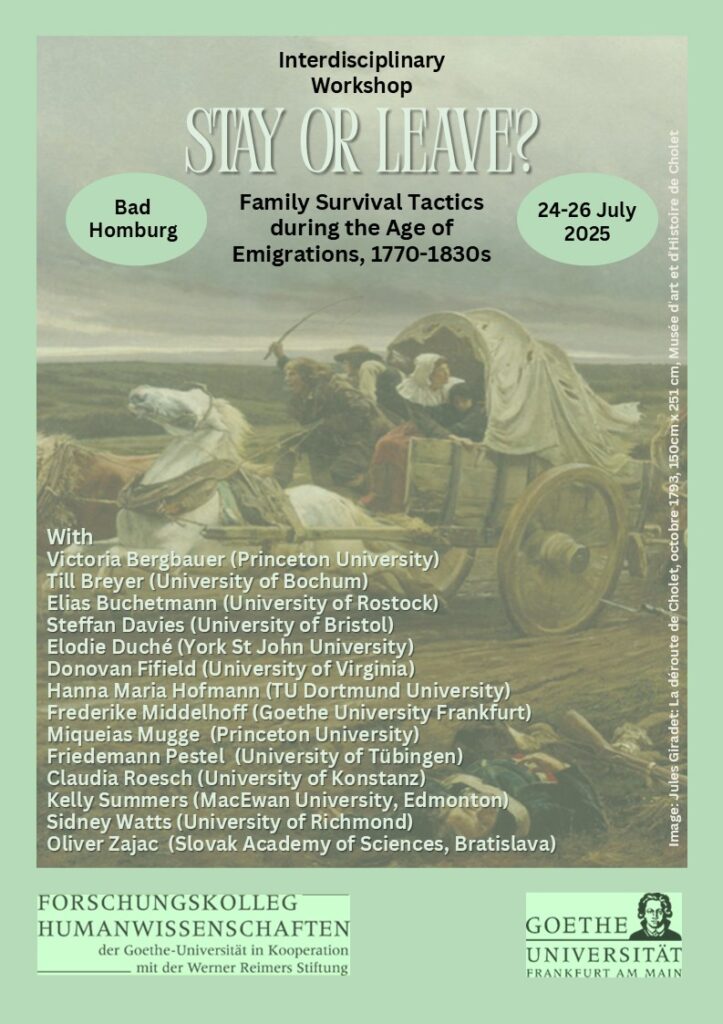Stay or Leave? Family Survival Tactics during the Age of Emigrations, 1770-1830s
Call for Papers
Interdisciplinary Workshop at the Forschungskolleg Humanwissenschaften of Goethe University Frankfurt am Main, Bad Homburg v.d.H. // 24-26 July 2025
Organization: Prof. Dr. Frederike Middelhoff, Associate Professor of Modern German Literature with a focus on Romanticism Studies, Goethe University Frankfurt am Main
PD Dr. Friedemann Pestel, Deputy Professor of Modern History, University of Tübingen
Dr. Kelly Summers, Assistant Professor of Humanities, MacEwan University
Find the cfp as PDF here; see the program here and below

During the Age of Revolutions (c. 1770-1830), Europe and the Americas were convulsed by a wave of interrelated political upheavals, social protests, slave rebellions, and wars. Republican alternatives to monarchies proliferated, even as colonial wars and abolitionist insurrections shook even the most entrenched empires. As a result, hundreds of thousands of people found themselves displaced and dispersed across the Atlantic world. While some chose to leave out of political or religious principle, others were forced out by some combination of ideological persecution, economic dislocation, and armed conflict. Wherever they ended up, the uprooted were forced to negotiate foreign and often hostile cultures and asylum practices.
While this momentous epoch has inspired much study, scholars have only recently drawn attention to the fact that the Age of Revolutions was also, inextricably, an age of both emigration (see, among others, Polasky 2023; Diaz 2021; Pestel 2019; Jansen 2018; Carpenter 2015; Jasanoff 2010) and re-migration (Summers 2024; Middelhoff 2021). Migrants were predominantly male, and have been studied as such, but they often brought or left behind networks of dependents including female relations, minors, servants and friends. Indeed, the navigation of gender norms and family relations were integral parts of the exilic experience. Drawing together historians and scholars of the literary, visual, and musical arts, this workshop aims to shed light on the least-visible members of these diasporas—women, children and servants—and to develop interdisciplinary perspectives on familial constellations of exile.
PROGRAM
Thursday, 24 July 2025
Conference Room, Forschungskolleg Humanwissenschaften Bad Homburg
15:30 Frederike Middelhoff (Goethe University Frankfurt), Friedemann Pestel (University of Tübingen), Kelly Summers (MacEwan University, Edmonton): Welcome & Introduction
Chair: Frederike Middelhoff
16:00-17:00
Donovan Fifield (University of Virginia): The Transatlantic Structure of Loyalists’ Family Relations during the American Revolution: A Comparative Study of the Apthorps and Hutchinsons of Massachusetts
17:30-18:30
Sidney Watts (University of Richmond): Emigrant Women, Children, Governess, and a Piano: The Transatlantic Migration and Settlement of the Du Pont Household (1797-1830)
Friday, 25 July 2025
Chair: Hanna Maria Hofmann (TU Dortmund University)
09:30-10:30
Friedemann Pestel (University of Tübingen): Surviving Emigration and Non-emigration: The Chateaubriand Family at the Margins of Revolution and Exile
11:00-13:00
Elias Buchetmann (University of Rostock): Therese Huber in Exile: Navigating Family, Politics, and Literature in the 1790s
Till Breyer (Ruhr University Bochum): Therese Huber’s Displaced Families
Chair: Kelly Summers
14:30-15:30
Victoria Bergbauer (Princeton University), Miqueias Mugge (Princeton University): Displaced: Family, Morality, and Home-Making in the Atlantic World [hybrid format]
15:30-16:30
Elodie Duché (York St John University): The ‘People Left At Home’: Families of British Prisoners of War on Parole in Napoleonic France and Mauritius
17:00-18:00 Comment and General Discussion: Hanna Maria Hofmann (TU Dortmund University)
Saturday 26 July 2025
Chair: Steffan Davies (University of Bristol)
09:15-10:15
Kelly Summers (MacEwan University, Edmonton): Torn Loyalties and Thwarted Livelihoods: The Burney-d’Arblays and the Challenges of Bi-National Marriage during the Age of Emigrations
10:45-11:45
Frederike Middelhoff (Goethe University Frankfurt): Exile, Return and the Family in Caroline de la Motte Fouqué’s Historical Fiction
11:45-12:45
Claudia Roesch (University of Konstanz): What if One Spouse Wishes to Emigrate While the Other Wishes to Remain? Consular Correspondence about Württemberg Pietist Migration to Pennsylvania, 1804-1837
Chair: Friedemann Pestel
13:45-14:45
Oliver Zajac (Slovak Academy of Sciences, Bratislava): The Charitable Society Towarzystwo Dobroczynności Dam Polskich as an Example of Public Engagement by Polish Female Émigrés during the Post-1831 Great Emigration
14:45-15:30
Comment and General Discussion: Steffan Davies
Closing Remarks & Farewell